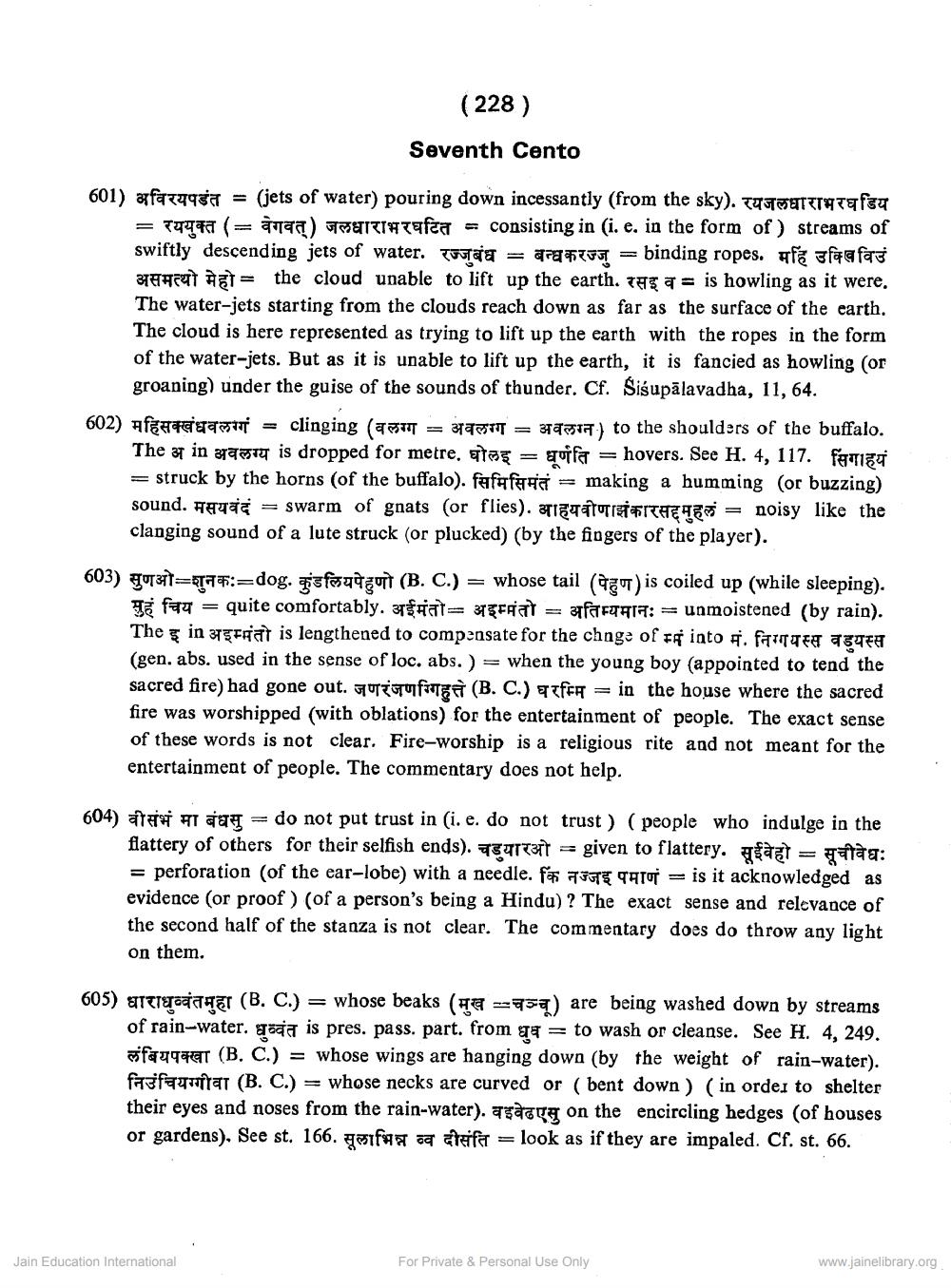________________
(228) Seventh Cento
601) afatg987 = (jets of water) pouring down incessantly (from the sky). TUTSUTTTTafsu
= Tuuta (= ) T TTrafca = consisting in (i. e, in the form of) streams of swiftly descending jets of water. Burada = arasv = binding ropes. Afa fa@fas असमत्थो मेहो= the cloud unable to lift up the earth. रसइव = is howling as it were. The water-jets starting from the clouds reach down as far as the surface of the earth. The cloud is here represented as trying to lift up the earth with the ropes in the form of the water-jets. But as it is unable to lift up the earth, it is fancied as howling (or
groaning) under the guise of the sounds of thunder. Cf. Siśupālavadha, 11, 64. 602) AfghaTTON = clinging (a = 37735TT = 3 ) to the shoulders of the buffalo.
The अ in अवलग्य is dropped for metre. घोलइ = धुर्णति = hovers. See H. 4, 117. सिंगाहयं = struck by the horns (of the buffalo). fafafura = making a humming (or buzzing) sound. Fra = swarm of gnats (or flies). TIETOTEFTTHEHE = noisy like the clanging sound of a lute struck (or plucked) (by the fingers of the player).
603) 43=TAF:=dog. EfTET (B. C.) = whose tail (OET) is coiled up (while sleeping).
fay = quite comfortably. #at= great = opfTETAA: = unmoistened (by rain). The s in अइम्मतो is lengthened to compensate for the chnge of ci into मं. निग्गयस्स वड़यस्स (gen. abs. used in the sense of loc. abs. ) = when the young boy (appointed to tend the sacred fire) had gone out. जणरंजणग्गिहुत्ते (B.C.) घरम्मि = in the house where the sacred fire was worshipped (with oblations) for the entertainment of people. The exact sense of these words is not clear. Fire-worship is a religious rite and not meant for the entertainment of people. The commentary does not help.
604) at May = do not put trust in (i. e. do not trust ) ( people who indulge in the
fiattery of others for their selfish ends). चडयारओ = given to flattery. सईवेहो = सूचीवेधः = perforation (of the ear-lobe) with a needle. fof 555 TATT = is it acknowledged as evidence (or proof) (of a person's being a Hindu)? The exact sense and relevance of the second half of the stanza is not clear. The commentary does do throw any light on them.
605) ETTITIET (B. C.) = whose beaks (@=757) are being washed down by streams
of rain-water. T a is pres. pass. part. from qe = to wash or cleanse. See H. 4, 249. wfaqqua (B. C.) = whose wings are hanging down (by the weight of rain-water). fagfaunat (B. C.) = whose necks are curved or (bent down ) ( in order to shelter their eyes and noses from the rain-water). agaate on the encircling hedges (of houses or gardens). See st. 166. sifat o ateifa = look as if they are impaled. Cf. st. 66.
Jain Education International
For Private & Personal Use Only
www.jainelibrary.org




